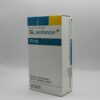
Cipla-pioglitazone (15mg tablet x 30)
$20.65
Cipla-pioglitazone (15mg tablet) is a medication produced by Cipla Pharmaceuticals that contains pioglitazone as its active ingredient. It is primarily prescribed to treat type 2 diabetes mellitus, a condition characterized by high blood sugar levels. Pioglitazone belongs to a class of drugs known as thiazolidinediones, which work by improving insulin sensitivity and reducing insulin resistance in the body. By doing so, it helps regulate blood sugar levels and can aid in controlling diabetes. However, it is important to note that this medication should be taken under the supervision of a healthcare professional and as part of a comprehensive diabetes management plan.
Cipla-pioglitazone is a medication available in the form of a 15mg tablet. It belongs to a class of drugs called thiazolidinediones, which are used to treat type 2 diabetes mellitus.
Detailed Description:
Pioglitazone helps to control blood sugar levels by increasing the body’s sensitivity to insulin, a hormone that regulates glucose (sugar) in the blood. It works by activating certain receptors in the body, primarily peroxisome proliferator-activated receptor-gamma (PPAR-γ), which plays a role in glucose and lipid metabolism.
Usage Information:
Cipla-pioglitazone is typically prescribed alongside a balanced diet and regular exercise to help manage type 2 diabetes. It is not intended for use in type 1 diabetes or diabetic ketoacidosis. The dosage and frequency of administration will be determined by your healthcare provider based on your individual needs, including your blood sugar levels and other factors.
It’s important to take Cipla-pioglitazone exactly as prescribed. It is usually taken once daily, with or without food. It may take several weeks for the medication to effectively control blood sugar levels, so it’s essential to continue taking it regularly even if you don’t notice immediate results. It’s not advisable to adjust the dosage or discontinue the medication without consulting your doctor.
Side Effects:
Like any medication, Cipla-pioglitazone may cause certain side effects. Common side effects may include weight gain, fluid retention, edema (swelling), headache, muscle pain, and upper respiratory tract infection. These side effects are generally mild and transient.
However, there are some rare but potentially serious side effects associated with pioglitazone. These include heart failure, liver problems, bladder cancer, and bone fractures. It’s crucial to be aware of these risks and discuss them with your doctor before starting the medication. Your healthcare provider will monitor you regularly for any signs of these side effects and may adjust your treatment accordingly.
If you experience any unusual or persistent side effects while taking Cipla-pioglitazone, it’s important to contact your healthcare provider for further evaluation and guidance.
Precautions:
Before taking Cipla-pioglitazone, inform your doctor about your medical history, including any liver disease, heart problems, bladder cancer, or any allergies you may have. It’s also important to mention any other medications, including over-the-counter drugs and supplements, that you are taking, as they may interact with pioglitazone.
Pioglitazone may increase the risk of pregnancy complications, so it’s important to use effective contraception while taking this medication if you are a woman of childbearing potential.
It’s important to attend regular check-ups and laboratory tests as recommended by your doctor to monitor your blood sugar levels and assess the effectiveness and safety of the medication.
| Weight | 0.06 kg |
|---|---|
| Dimensions | 3 × 3 × 1 cm |
Related products
Cadbower Xr 1000 is a medication available in the form of a 1000mg tablet. It is commonly prescribed for various medical conditions and contains an active ingredient that provides therapeutic benefits. The specific details regarding its purpose, usage, and potential side effects would require consulting a healthcare professional or referring to the medication's official documentation.
Cipla-pioglitazone is a medication available in the form of a 30mg tablet. It contains the active ingredient pioglitazone, which belongs to a class of drugs called thiazolidinediones. Cipla-pioglitazone is primarily used in the treatment of type 2 diabetes mellitus. It helps to improve blood sugar control by increasing the body's sensitivity to insulin, a hormone that regulates blood sugar levels. This medication is typically prescribed as part of a comprehensive treatment plan that includes diet, exercise, and other anti-diabetic medications. As with any medication, it is important to follow the prescribed dosage and consult with a healthcare professional for personalized advice and guidance.


